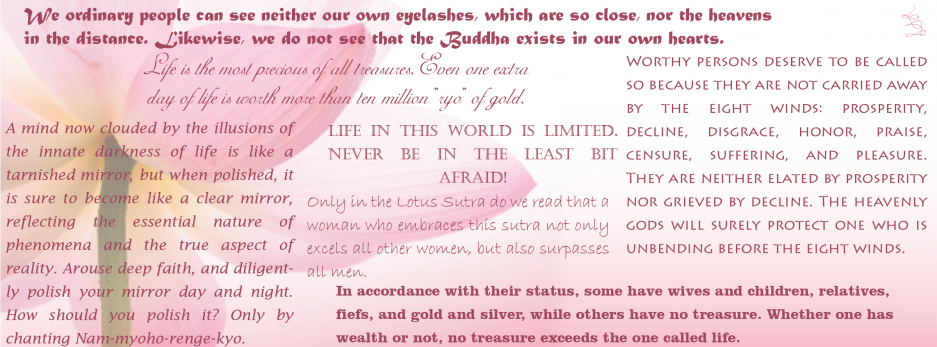If we examine the “Treasure Tower” chapter of the Lotus Sutra, we find Shakyamuni Buddha, Many Treasures Buddha, and the Buddhas of the ten directions who are emanations of Shakyamuni Buddha gathering together. And why? As the sutra itself says, “Each . . . has come to this place on purpose to make certain the Law will long endure.”Shakyamuni, Many Treasures, and the other Buddhas intend to insure the future propagation of the Lotus Sutra so that it can be made available to all the children of the Buddha in times to come. We may surmise from this that their concern and compassion are even greater than those of a father and mother who see their only child inflicted with great suffering. Hōnen, however, shows not the least concern about their compassion, but would tightly shut the gates to the Lotus Sutra in the Latter Day of the Law so that no one would have access to it. Like a person who tricks a demented child into throwing away a treasure, he tries to induce people to discard the Lotus Sutra, a shameless thing to do indeed!
If someone is about to kill your father and mother, shouldn’t you try to warn them? If a bad son who is insane with drink is threatening to kill his father and mother, shouldn’t you try to stop him? If some evil person is about to set fire to the temples and pagodas, shouldn’t you try to stop him? If your only child is gravely ill, shouldn’t you try to cure him or her with moxibustion treatment? To fail to do so is to act like those people who see but do not try to put a stop to the Zen and Nembutsu followers in Japan. [As Chang-an says,] “If one befriends another person but lacks the mercy to correct him, one is in fact his enemy.”
——————-
The Buddhas of the ten directions gather in one place out of their desire to ensure the future propagation of the Lotus Sutra, to see to it that the Lotus Sutra is made available to all, who are all children of the Buddha, in the future.
The Nirvana Sutra states that just before dying, Shakyamuni lamented: “I will die shortly. The matter of King Ajatashatru is my only misgiving.” King Ajatshatru was bitterly hostile towards Shakyamuni, and had even tried to kill him. He had killed his father to take over the throne; but even as a king, inwardly his life was impoverished and empty. Shakyamuni was deeply pained by the thought of Ajatshatru’s unhappiness.
A disciple then asked him: “If the Buddha’s passion is directed towards all living beings equally, then why is he concerned only about King Ajatshatru?”
Shakyamuni then answered: “Consider a case of a couple that has seven children. The parents love all their children equally and without discrimination. However, if one child falls ill, wouldn’t the parents be most concerned about that sick child? I will definitely not abandon- I will definitely not forget the person who is most miserable. Rather, I will try had to save that person.” This is the Buddha’s conviction.
Nichiren Daishonin strove to save all the people of Japan including those who had persecuted him and even those who had exiled him to Sado. From the time he declared the establishment of his teaching, the Daishonin never retreated a step in his great and merciful struggle for the people, whom he loved as his own children. In the “Opening of the Eyes”, the Daishonin indicates his frame of mind prior to establishing his teaching, saying that he was fully aware that if he did not and proclaim the correct Buddhist teaching for the Latter Day, he would be lacking in compassion.
No matter how compassionate someone might appear to be but if he fails to take action, it is like he has no compassion. The opposite of compassion is “false friendship”, which mirrors the society today. President Toda said: “People’s lives today lack a sense of compassion… Isn’t the lack of compassion that is the characteristic of the present age?”
It is though our efforts at dialogue, though our actions, we fundamentally change the society that lacks compassion and is awash with false friendship. We transform the destiny of our society which has a tendency to be discriminatory and lacking in compassion. We send sunlight of spring to a society that is locked in the frigid winter. President Ikeda says: “I am sure the Daishonin most highly praises all of you who are steadfastly carrying through with the bodhistavva practice of compassion as the true disciples and as “followers who share my spirit”.”
